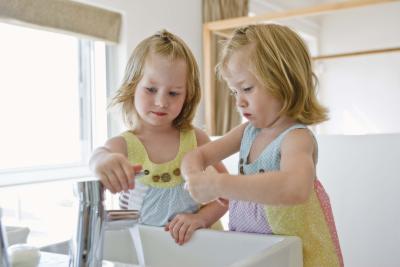OCD stands for obsessive-compulsive disorder and manifests itself when the patient has having recurring thoughts or worries he can’t get out of his head, no matter how much he tries. These thoughts lead to ritualistic behaviors that OCD sufferers do to try to get rid of the thoughts. By performing certain rituals, the person with OCD believes he is warding off bad things. OCD is an anxiety disorder, and even though it is more prevalent than many other types of childhood disorders, you may not even know your child has it because he probably hides the disorder out of embarrassment.
About OCD
If your child is diagnosed with OCD, she isn’t going to just snap out of it, nor can she simply stop the rituals. It’s not that easy. Asking her to stop would be like asking an asthma victim to stop gasping for breath. Kids with OCD cannot control their thoughts and ritualistic behaviors, even though they want to. OCD interferes with your child’s life in many ways. For example, she might feel pressure, frustration or guilt for not having the time to engage in normal activities, because the rituals are taking up so much of her time.
Common Obsessions and Compulsions
Kids with OCD have fear of germs and dirt, fear of being contaminated, a need for order and precision, religious obsessions, preoccupation with bodily waste, lucky or unlucky numbers, sexual thoughts, aggressive thoughts, fear of harm or illness to themselves or to others, preoccupation with items around the house and intrusive sounds or words. The most common compulsions or rituals are grooming rituals like constant hand washing or showering, going in and out of doorways, checking an appliance to make sure it’s plugged in or not plugged in, checking to make sure a door is locked, rituals to undo something deemed “contaminated,” arranging things, hoarding, collecting and cleaning rituals.
Cognitive Behavioral Therapy
A study from the Bradley Hasbro Children’s Research Center and published in the May 2008 issue of the “Journal of the American Academy of Child and Adolescent Psychiatry” indicates that family-based cognitive behavioral therapy (CBT) helps to manage and reduce symptoms. CBT can help your child avoid carrying debilitating OCD thoughts and behaviors into adulthood. CBT involves exposing kids to their fears, while making them agree to forgo the ritual after exposure. Eventually, kids should realize that their anxiety about the fear goes away without doing the ritual. An example is making your kid who fears dirt touch the inside of a trashcan and not wash his hands. You are teaching the child to “fight” the OCD using this method.
Medication
More research from the Bradley Hasbro Children’s Research Center and published in the October 2010 issue of the “Journal of the American Academy of Child and Adolescent Psychiatry” indicates that — in addition to CBT — medicine can also be effective in treating OCD. The antidepressant sertraline, a serotonin reuptake inhibitor, has been shown to be effective. The three most common types of treatment for OCD are CBT, medication — or a combination of the two.
Don’t Indulge Your Child
A 2009 study published in the “Journal of Consulting and Clinical Psychology” indicates that if you indulge your child by being a part of his OCD rituals, you could be making matters worse. If you try to give comfort by going along with rituals of a child with OCD, you are reinforcing the rituals. You are validating the rituals and giving them some normalcy, and this is something that you don’t want to do, says Dr. Lisa Merlo, lead author of the study. During research for the study, researchers noted that the more severe the child’s OCD, the more accommodating the parents were. When parents stopped playing along with the rituals, the children started improving.





